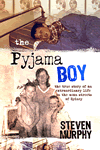anna beth mccormack
the pyjama boy
by steve murphy
Steve Murphy addresses a motley audience of kids and adults in my local library. We have been attracted by a flyer and report in the local paper. He has, he says, taken three months off duty as a Queensland police officer, to travel, talk and promote his first book: The pyjama boy (Sid Harta Publishers, 2004, 1-921030-07-0, $24.95).
He is outgoing and verbal (?I can talk under water with a mouth full of marbles?). He produces evidence: school reports larded with Ds, family photographs, a video tour through a place you wouldn?t want to live, police records from his teenage years. His vigour and directness convince you that this is book you want to read.
Steve was abandoned by his mother soon after his birth on decimal-currency day in 1966. His father brought him to Sydney, but left him in the care of an alcoholic stepmother while he himself was in gaol. Although he was her meal ticket, she abused him cruelly at home, physically and psychologically, while outside he was ridiculed as the ?pyjama boy?. At eleven his father rescued him and sent him to live with an uncle and aunt on a dairy farm. His aunt was a ?Walton?s mum?, but his uncle exploited his labour and was abusive. Steve learned to be a clown in school, was in court for theft (?This is my mug shot?), and at fifteen left school to find a niche in the adult world.
The value of The pyjama boy for young adult readers begins here, for the niche to which Steve?s childhood destined him was likely to be narrow and dirty and quite possibly in prison. Mercifully, Steve had found the value of work---be it bottle-collecting for his stepmother, or doing his uncle?s chores on the farm. (?I don?t hate him. I learned a lot from him.?) By the time Steve was twenty, he had worked in many jobs, imbibed many tinnies, been intimate with many young women, married and fathered a daughter, fallen into hire-purchase debt, become well-known to the Townsville police as a ?demon speeder?---and formulated some goals for his life.
His main goal was to cross the divide and join the police. It took him eight years to acquire the necessary education and redeem his personal record. He spent some years in the army, including six months with the United Nations in Namibia (?One you?ve seen African kids starving, no welfare of any sort, man, you?ve got no worries here in Australia?), and then as a prison officer in Townsville. To keep his wife and, now, two children in the manner he thought they deserved, he also moonlighted in many jobs, including taxi driver, semi driver and ice-cream salesman. His physical fitness peaked as he did serious body building, resisting the temptation to ?win? through taking drugs. Finally, he was accepted into Queensland Police, and the book ends abruptly with his graduation.
Steve also managed to find his mother, and to meet her once before she died. In the process, he discovered that he was one of perhaps a dozen children, who were adopted out as babies. Now he has four half-brothers he can call family.
Against all the odds, against all discouragement, Steven persisted and fulfilled his goals. Now, ten years a policeman, he speaks to the youth of Australia, using his story to motivate those who face great obstacles to living an ordinary life; and to adults, for no child should be allowed to slip through welfare cracks as he did. In The pyjama boy he gives his email address for anyone who would like him to speak to a group (stevenmurphy_11@bigpond.com).
Being one man?s story, one hero?s journey, the book does not present a blanket recipe for young adults trying to cope with the negative effects of a bad childhood. It does not, for example, mention sexual abuse, as this was outside Steve?s personal experience. He does give some coverage to the panic attacks he suffered while working as a prison officer, but there is little in the end about how he dealt (and still deals) with this consequential psychological disturbance. Nor does he treat how he avoided, or overcame, suffering from debilitating rancour against those who had abused or let him down as a child. The book is not introspective. It is about behaviour, and assessing and changing behaviour and values to enable you to lead a good life. A point repeatedly stressed is the importance of doing good for yourself by making the best of your time at school, regardless of your other troubles.
The pyjama boy does not suffer from the warts of self-pity or self-congratulation. Written in the third person, it reads as a hard-hitting narrative, backed up by photographs. Not being a natural reader or writer, Steve went through seventeen drafts as he listened to and responded to comments from professionals and friends. The result is a well-polished, accessible, frank text that should be in every high school library. I look forward to its continuation in Steve?s next book.
Over the last decade or so we have become accustomed to the genre of bleak social realism, in which young adults struggle in a storm of social and personal deprivation or abuse. It has even been suggested there has been too much of this genre. But here speaks a book that, ringing with truth, justifies the genre and takes up with ?real? realism where fiction often leaves off.
Anna Beth McCormack is a New South Wales reviewer

